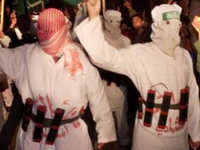International Terrorism: Voice of the pen
Many countries, developed, developing or under developed, have had or are experiencing terrorist attacks and suffer from this contemporary cancer. History is replete with military conflicts triggered by overly ambitious imperialists, which left behind sad legacy and grieving innocent families. This legacy is now being taken forward by terrorists who use the veil of religion to perpetrate heinous acts, designate themselves as Emirs, lay sole claim to being disciples of the Almighty, and are remorseless about their acts of terror. Unfortunately, most of these crimes are carried out under the holy slogan of Islam bringing bad name to the religion. The terror acts leave behind an indelible wound though Islam always preaches peace and tolerance.

Though the West has declared a war against terror, it is mostly aimed at projecting a sound anti-terrorism policy rather than waging a serious campaign. Some countries like India and Uzbekistan are battling terrorism despite obstacles, and it is well known that terrorists never wait and keep initiating coordinated actions to counter anti-terrorist measures adopted by different countries.
Significantly, terrorists often know they can succeed because some nations merely restrict themselves to admonitions and rarely resort to strong arm methods. On the other hand, use of strict anti-terrorist measures attracts accusations of disproportional use of military force and violation of democratic norms and human rights. The double standards used by the international community vis-à-vis combating terrorism are apparent here.
As the world grapples with these double standards, journalists must not remain silent. They must use their only weapon - their pen. Today's article is therefore captioned "Voice of the pen".
Raju was the only bread-winner in a family living near the Borivilli (Mumbai, India) railway station. He had an aging father, a sick invalid mother and a young sister Rekha. On the morning of July 11, 2006, while travelling to work, he had no clue that his life will be nipped in the bud, and that he was seeing his family for the last time. A series of bomb explosions snuffed out his life.
A similar tragedy had occurred during the Andijan events in May 2005. An elder brother had married two years earlier and sent his younger brother to work abroad to earn money. They never saw each other as a ruthless terrorist attack took the elder brother's life.
What was the sin of these innocent people?
Such sad events are happening place not only in India, but in friendly Central Asia, particularly in Uzbekistan which has bore the brunt of terrorist attacks on several occasions.
The perpetrators of terrorist attacks are often those who have been fooled into joining terrorist groups such as the Islamic Movement of Uzbekistan (IMU), Hizb-ut-Tahrir (HUT), and Lashkar-e-Toiba (LeT), and Jaish-e-Mohammad (JeM), the latter two being Pakistan-based terrorist organisations.Nooneknows when terrorists will open their eyes and sense the reality, however, their reckless actions have led to situations wherein many innocent people will never open their own eyes.
It is necessary that countries like India and Uzbekistan must unite their efforts in the battle against with terrorism. Presently, there is an Indo-Uzbek Joint Working Group (JWG) to fight terrorism, and the Regional Anti-Terrorist Structure (RATS) of the SCO is functioning from Tashkent. But this is not enough. Though Central Asian countries are trying to fight the evil of terrorism jointly, often this battle does not progress beyond agreements and declarations and is beset with political and other vested interests. Such mentality grossly interferes with battle with terrorism. If Asian countries are to fight terrorists together, then it is vital that secret information on them and their helpers and finances be regularly shared.
People in Central Asia oppose the creation of an Islamic Caliphate in their region, an idea that forms the basis of Hizb-ut-Tahrir’s programme. Muslims of Central Asia rather support a secular state. The Taliban experience in Afghanistan has shown us what can happen when a group of radicals brutally execute their ideas into practice. It simply puts the entire humanity under peril.
In recent times, India has been a victim of 110 bomb explosions. A number of terrorist acts have rocked Uzbekistan as well. The planning to create disturbances in Uzbekistan is being worked out in Southern Waziristan, along the Pakistan-Afghanistan border which is a secure base of the IMU and HUT. The terrorists include Uzbek nationals as well and repeated calls by Uzbekistan to Pakistan to extradite these nationals have failed to elicit the desired response. Similarly, perpetrators of terrorist acts in India are mostly hiding in Pakistan. It is time to effectively use international pressure on Pakistan to accept its deal international obligations in this regard.
Similarly, terrorists hostile to India and Pakistan, such as HUT cadres, have found refuge in Sudan, Indonesia and Bangladesh where HUT contnues to function openly though it is banned in many counties. In Bangladesh, HUT has its own Internet site which is not banned. At the site, Imran Yusufjai and Naveed Butt are mentioned as the head of HUT in Pakistan, Muhammad Ismail Iusanto, the leader in Indonesia and Mohiuddin Ahmad in Bangladesh, etc.
If Afghanistan can extradite terrorists, why can't Pakistan? The whole world knows who set up the Taliban and that Southern Waziristan is the refuge of terrorists, including bin Laden. So why on July 21, 2006 , did Pakistan refuse to extradite the Indian terrorist Dawood Ibrahim? And why hasn't it extradited Uzbek terrorists to Uzbekistan? Unfortunately, so far, world opinion has been silent on these questions. It is time to answers these queries.
Aloke Shekhar
Pravda.Ru
Subscribe to Pravda.Ru Telegram channel, Facebook, RSS!


